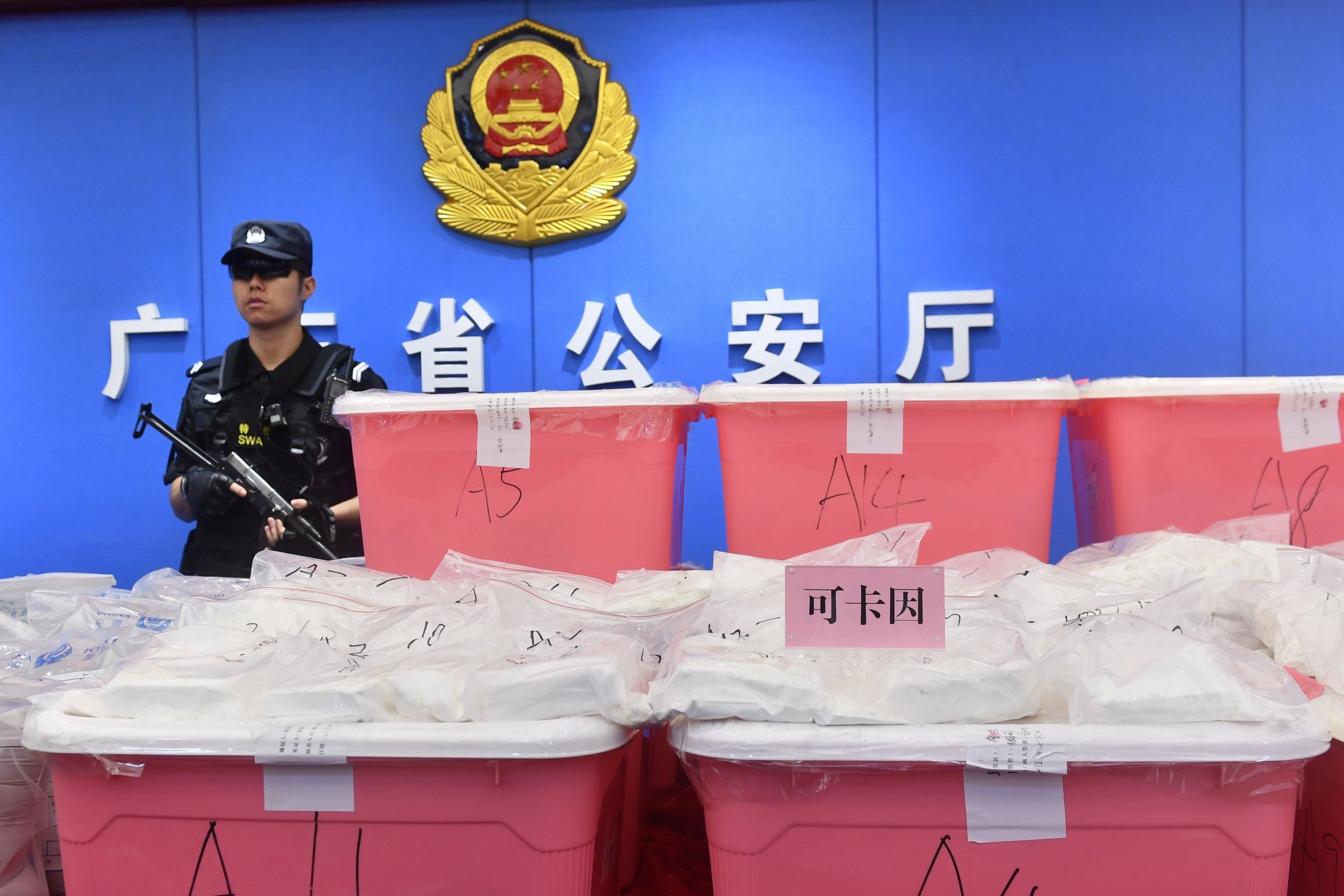
President Donald Trump on Friday said that China does not have a drug problem, and suggested that the U.S. should emulate its harsh drug-regulation tactics — but data from China tells a different story.
Trump spoke in the White House Rose Garden Friday to announce that he would declare a national emergency to secure funding for a border wall without Congressional approval. During the address, Trump also spoke about the ongoing substance abuse epidemic in the U.S., and referred to conversations he had with Chinese leader Xi Jinping, who Trump said told him that China did not have a drug problem because it could use the death penalty to punish drug dealers.
“If we want to get smart, we can get smart,” Trump said. “You can end the drug problem, can end it a lot faster than you think.”
The catch is that China does, indeed, have a drug problem, according to experts.
“It is incredibly disturbing that President Trump would claim there is not a drug problem in China because they use the death penalty,” says Ann Fordham, executive director of the International Drug Policy Consortium. “I don’t know how it’s possible to claim that. The administration should check its facts, especially when advocating use of the death penalty for drug offenses.”
A 2017 report from China’s National Narcotics Control Commission said there were 2.51 million drug users in China as of late 2016, a year-over-year increase of nearly 7%. A report from the Brookings Institution also noted that the number of officially registered drug users in the country increased every year between 1998 and 2016.
The actual number of drug users in China, beyond the 2.5 million who are officially registered, is likely “much higher,” Fordham says. In the U.S., an estimated 30.5 million people currently used drugs, including marijuana, in 2017, according to federal data.
As of last year, illicit drug use was widespread enough that China invested the equivalent of at least $1.5 million in technology that would allow the government to monitor sewage for signs of drug use, Nature reported.
Synthetic drugs have been a particular problem for China, both domestically and in terms of exportation. American officials have long blamed China for the influx of synthetic opioids, such as fentanyl, that wind up in the U.S. In December, Chinese leaders pledged to classify fentanyl and all related drugs as controlled substances, a move that would theoretically strengthen punishments for those who sell these drugs and slow their flow into the U.S.
But even within China, synthetic drugs pose a major problem. In 2016, seizures of methamphetamine, ketamine and other synthetic drugs in China rose by 106% year-over-year, according to the South China Morning Post. There were about 1.5 million Chinese drug users addicted to synthetic narcotics in 2016, according to the National Narcotics Control Commission report, and these drugs have supplanted heroin as the most widely used narcotics in the country, according to the Brookings Institution.
Even the harsh punishments Trump lauded in his speech appear not to be working as intended. Last year, Chinese State Councilor Zhao Kezhi advocated for a more intense crack-down on drug-related crime, according to state-run newspaper China Daily. The Brookings report adds that “nobody knows how many [people] are executed each year for drug offenses,” and says that “despite the relentless and draconian counter measures, China’s drug problem does not seem to have subsided much.”
Fordham says she doesn’t even like to talk about whether or not the death penalty is an effective enforcement mechanism, because to do so ignores the fact that punishing drug crimes with execution violates international law. Nonetheless, she says there’s no evidence that such approaches work.
Hannah Hetzer, senior international policy manager at the Drug Policy Alliance, a nonprofit that advocates for a health- and science-based approach to drug regulation, says it’s dangerous to promote the idea of introducing the tactic in the U.S. or abroad.
“This is yet another example of [Trump] supporting extremely repressive policies in other parts of the world, and also domestically,” Hetzer says. “Rushing to demonize and criminalize and even put the death penalty in place for [drug users and sellers] is not the right answer.”
Instead, Hetzer says, any country looking to curtail drug use should expand access to affordable addiction treatment, and scale up harm-reduction techniques like syringe exchanges, safe drug consumption sites and access to overdose-reversing naloxone.
“There’s an under-availability of treatment, broadly, for people who need it,” Hetzer says. “If people are experiencing problems associated with their drug use, they should be able to access treatment almost immediately, and affordably.”
More Must-Reads from TIME
- Cybersecurity Experts Are Sounding the Alarm on DOGE
- Meet the 2025 Women of the Year
- The Harsh Truth About Disability Inclusion
- Why Do More Young Adults Have Cancer?
- Colman Domingo Leads With Radical Love
- How to Get Better at Doing Things Alone
- Michelle Zauner Stares Down the Darkness
Write to Jamie Ducharme at jamie.ducharme@time.com